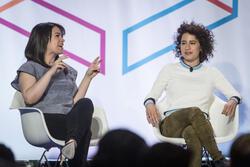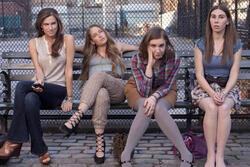A Love Letter to Crazy Ex-Girlfriend
Despite Hollywood’s history as a haven for Jewish artists and producers, the contemporary Jewish experience is rarely authentically represented on screen, especially in television. We get characters like fussy, metrosexual Schmidt from New Girl or loud-mouthed mother-in-laws. Nuanced representations of Jews, especially young Jewish women, are few and far between, save for perhaps Broad City. Instead, many characters are “coded” Jewish with vaguely Semitic sounding last names and soft-core Jewish features.
Enter Rachel Bloom and her hit television series, Crazy Ex-Girlfriend. Heralded as one of the best new shows on television, CEG weaves together dark comedy, musical numbers, fantasy, pop culture satire, and feminist critique. It is earnest without being heavy-handed and thought-provoking without being preachy. And it’s unapologetically Jewish. Rachel Bloom’s Rebecca Bunch is a Scarsdale-born, Harvard-educated lawyer with a hyper-critical Jewish mother and diagnosed anxiety and depression. She binge-eats bagels and, in a “JAP Rap Battle,” tells her nemesis to “sheket bavaka-shut the hell up.” After a butter commercial encourages her to seek happiness, she quits her high-powered job at a New York law firm to move to California and pursue her childhood sweetheart. In many ways, Rebecca is the ultimate anti-hero: self-sabotaging, obsessive, manipulative, selfish. But as the audience watches her spiral more and more out of control, we pray for her redemption, and her moments of restraint and self-awareness make us feel proud, as if she were our own slightly delusional and emotionally stunted best friend.
The American Jewish comedic tradition is full of clinically anxious, depressed, and self-deprecating men. These men, by expressing their flaws and neuroses, make us laugh and garner our respect. A “crazy” woman is received far less warmly. Television’s new Jewish American comedy scene, however, is being taken over by badly-behaved Jewish women like Bloom’s Rebecca, Lena Dunham’s Hannah, and Broad City’s Abbi and Ilana. These are women who take their Zoloft with mimosas and wreak havoc at their workplaces. Perhaps these characters aren’t the positive role models we want our daughters to emulate, but in many ways they are more realistic than a female thirty-something who has it all figured out.
Naturally, CEG’s portrait of a white, Harvard-educated, one-percent-er does not come close to representing all Jews (where are the Sephardim?) but it does illustrate that the Jewish American experience is a unique entity. The ubiquitous pressure many women face to get married and have children while being at the top of a competitive field is coupled with cultural expectations for success––after Rebecca finally confronts her mother about her constant beration, her mother replies, “I want you to survive! Our people are not about happy, we're about survival.”
Throughout the series, Rebecca tries desperately to win her mother’s approval and receive the Garfinkel ring carried over from Europe when her ancestors fled persecution. We get a funny shot of Garfinkels-past, kvetching on the ship as they travel to America. The inherited trauma of age-old persecution creates the background for both Rebecca and her mother’s insecurities and anxieties.
Bloom manages to present her protagonist’s explicitly Jewish story while also sensitively and smartly portraying nuanced and subversive characters of differing races, ethnicities, and sexualities. It’s Jewish media that does not whitewash the rest of the world. Rebecca’s love interest, Josh Chan, is Filipino which is especially notable considering the general desexualization of Asian men in media. He and his family are presented not as cultural stereotypes, but as fully-realized individuals. His Latina girlfriend, while initially presented as Rebecca’s unattainably hot competition for Josh’s attention, becomes a much more multi-faceted character as the series progresses. Meanwhile, Rebecca’s Indian neighbor is not, say, a tech-geek with an accent, but an apathetic college-dropout.
Ultimately, Rebecca’s journey is a quest for the emotional care she was denied as a child, and a search for self-approval in spite of her “craziness.” It’s a universal story––we all long for this kind of love and acceptance. Rachel Bloom could have omitted her family history and dialed down the cultural references. But in telling Rebecca’s universal story as a specific, unique Jewish-American story, Rachel Bloom has created an authenticity within Crazy Ex-Girlfriend that cements it as a modern masterpiece.
*CW's Crazy Ex-Girlfriend returns on October 21, 2016*








I adore rachel bloom!!!!!!!!!!!!! would love to see her play fannie brice in funny girl! no one else could truly do it justice today.
I adore this show